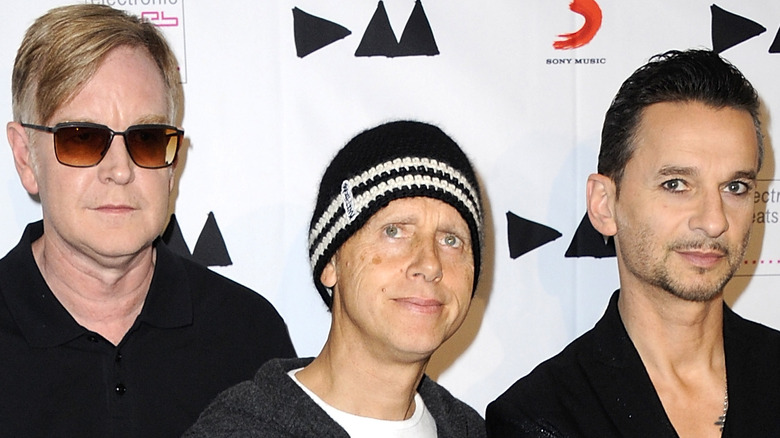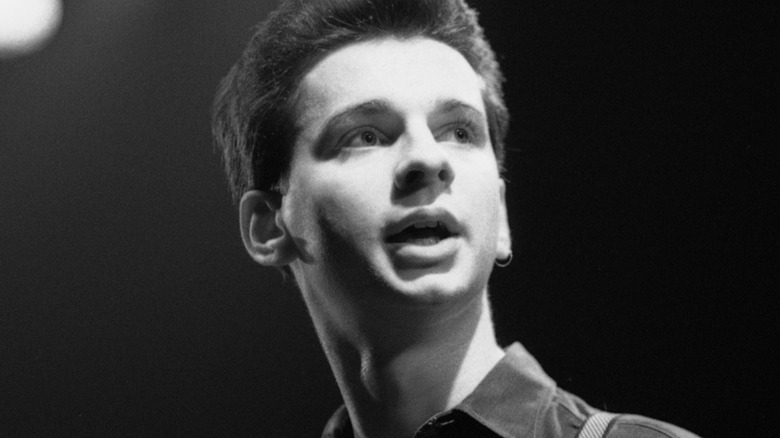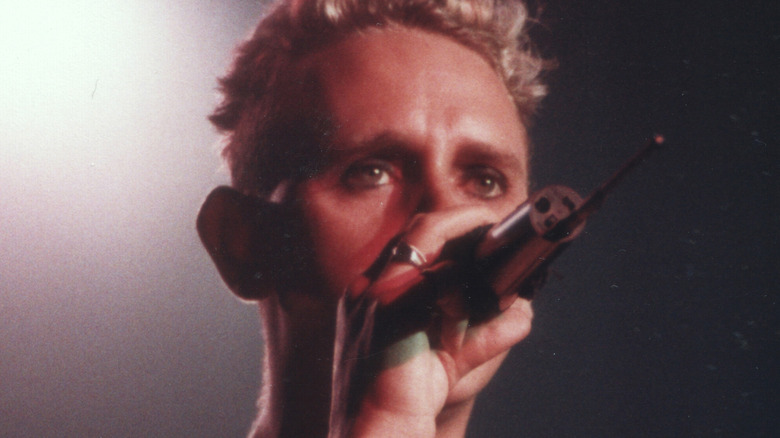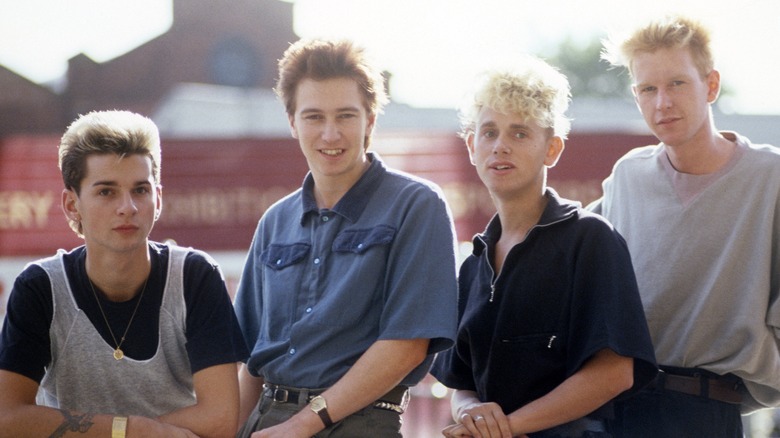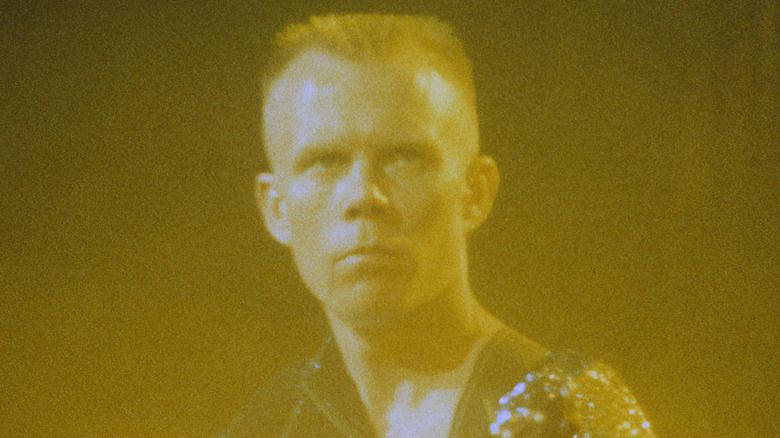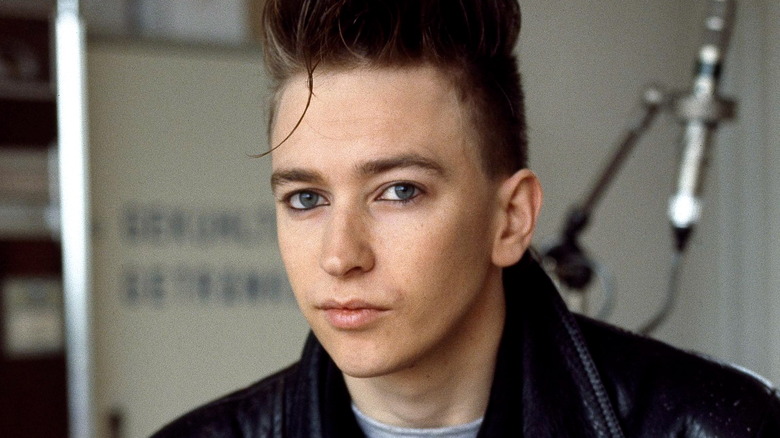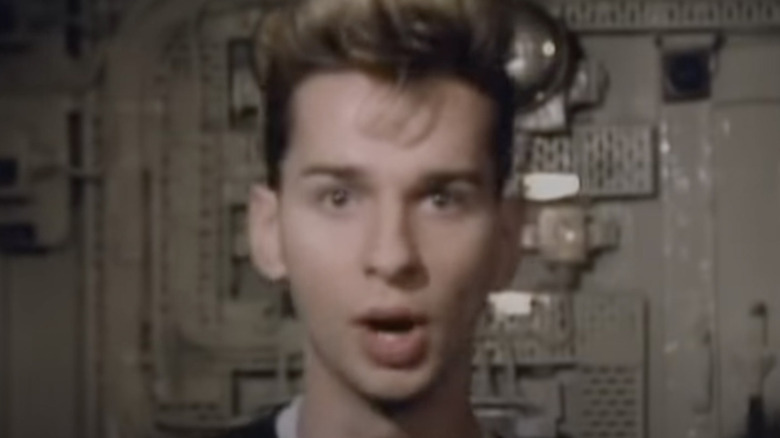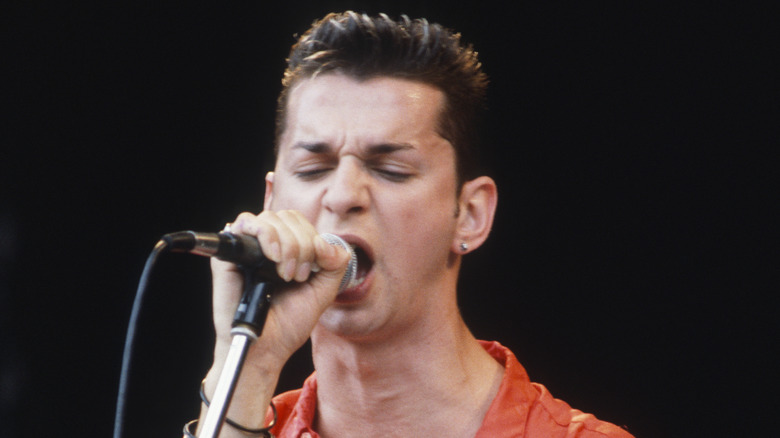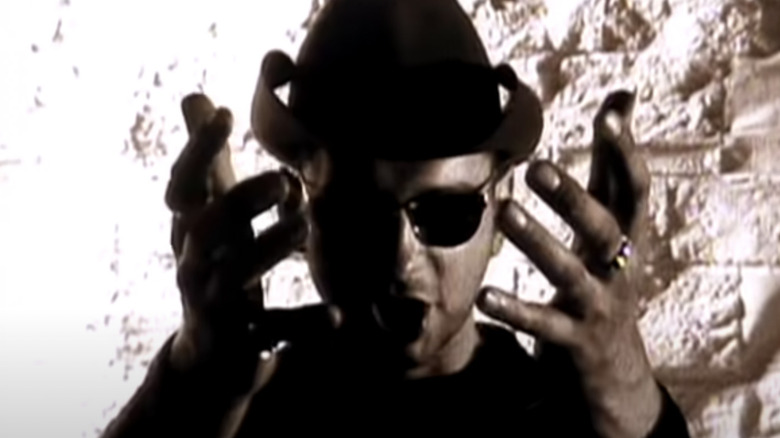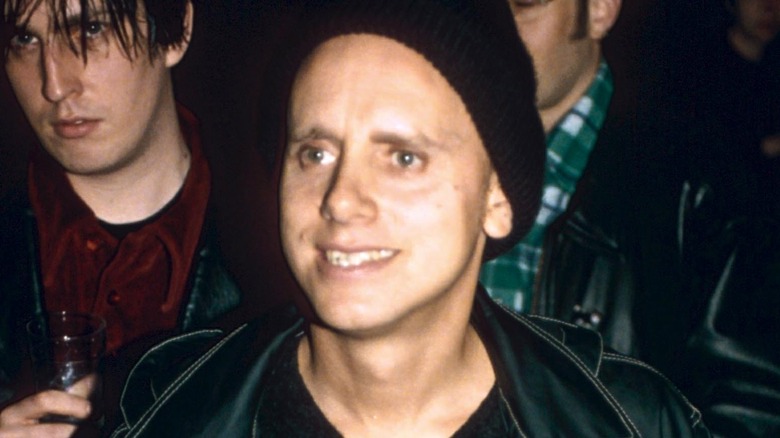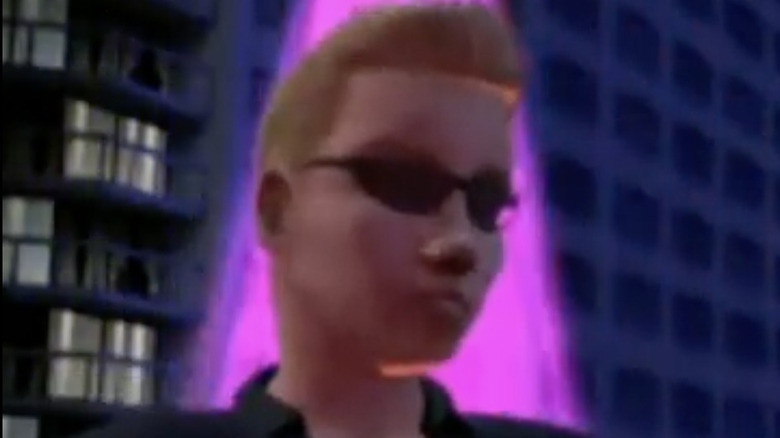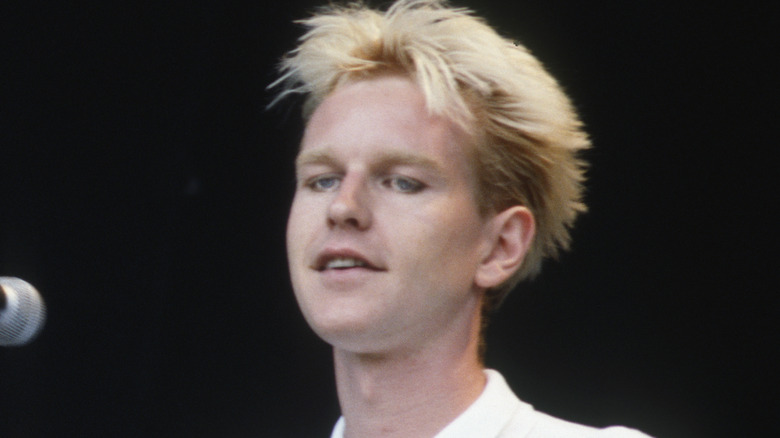The Untold Truth Of Depeche Mode
A pioneering harbinger of things to come — synth-pop, dark New Wave, goth rock, and mopey, the disaffected rock of British origin, Depeche Mode did a lot of the work in defining what the 1980s were going to sound like. And then, as the decade came to a close they added guitars into the space-age, atmospheric musical craftsmanship to help usher in the age of '90s alternative rock and became one of the biggest bands in the world. Along with the likes of the Smiths, New Order, and The Cure, Depeche Mode dominated alternative rock for years, with the brooding, haunting voice of Dave Gahan giving life to the electronically laced songs of Vince Clarke, Martin Gore, Andy Fletcher, and Alan Wilder. Among their classic tracks: "Blasphemous Rumors," "Enjoy the Silence," "I Feel You," "Personal Jesus," "Master and Servant," "People Are People," and "Policy of Truth."
Just can't get enough? Well, everything counts and you'll never be let down again with the strange, lovely story of Depeche Mode.
There's No Romance in China, but there is Composition of Sound
Depeche Mode wasn't the first musical project for its members, merely the end result of several early bands that didn't last long, according to AllMusic. In 1976, Vince Clarke and Andy Fletcher, a pair of keyboard and synthesizer players who knew each other from school in Basildon, England, formed a group called No Romance in China. It fizzled out, and by the end of the decade, Clarke had moved on to create another duo called French Look, this time teaming up with Martin Gore, a guitarist and keyboard player who'd just departed an acoustic, two-person act called Norman and the Worms (via Diffuser). When Clarke recruited Fletcher, the duo became a trio and took on the name Composition of Sound, with Clarke acting as the lead singer he chanced upon another Basildon native named Dave Gahan singing David Bowie's "Heroes" while playing with a group of other musicians in 1980, according to Q104.3. Clarke was so moved that he quickly offered him the frontman position in Composition of Sound.
The lineup was in place, and soon the sound would be, too. The group dropped its traditional rock instruments in favor of a totally electronic sound. The impetus: British electro-pop act Orchestral Manoeuvres in the Dark, who'd later have a huge hit with the "Pretty in Pink" soundtrack cut "If You Leave." "Vince Clarke told us that they heard 'Electricity' by us in a club in Basildon and went, 'We want to do that,'" OMD's Andy McCluskey told Yahoo! News.
The meaning of Depeche Mode
In the very early '80s, Composition of Sound played gigs around England until switching to the more permanent, French-based moniker of Depeche Mode. According to Billboard and many other media outlets, the phrase translates to "fast fashion," while some fans believed it meant "depressed mood" (per the Seattle Times), befitting the band's dark and moody tunes. The newest group member, singer Dave Gahan, a student and practitioner of fashion design who worked as a clothing store window display artist, provided it, taking the name whole cloth from that of a French fashion magazine. "He was doing fashion design and window display and used the magazine Depeche Mode as reference. It means hurried fashion or fashion dispatch," Martin Gore told No1 Magazine. The latter example is actually the more accurate one, according to "Depeche Mode FAQ" by Michael Christopher. "Depeche Mode" correlates roughly to the straightforward "Fashion News," as "depeche" is easily confused with "dépêcher," French for "to hurry."
As the band became successful, it nearly faced repercussions for the swipe. "There were lawsuits flying around because we'd copied the name," Gahan told Q. "Once we became more successful they let it go because we probably helped them to sell more copies."
The risky business venture of Depeche Mode
After honing their musical chops and perfecting their sound by playing gigs at a couple of bars in and around their hometown of Basildon, England, in 1980, Depeche Mode decided to try to find a label that would sign them, record them, and release their albums. The group got together and self-produced a demo recording, but rather than take the traditional route of mailing the tape to record labels and waiting an indefinite amount of time for a response, members Vince Clarke and Dave Gahan hand-delivered their cassettes to record labels during business hours. "Vince and I used to go 'round to record companies and demand that they play it," Gahan told Rolling Stone. If an important staffer didn't listen to it then and there, the two musicians would be on their way. "They'd say, 'Leave the tape with us,' and we'd say, 'No, it's our only one.' Then we'd say goodbye and go off somewhere else."
Eventually, Depeche Mode wound up with an agreement — not exactly or technically a record deal — with Mute Records. According to Michael Christopher's "Depeche Mode FAQ," the band agreed to an informal, spoken, "handshake deal" that wasn't calcified into a written document for decades.
Depeche Mode lost its founder quite early
Depeche Mode's initial sound — chilly, unabashedly synthetic, keyboard-driven electro-pop — was thoroughly captured on the group's first album, 1981's "Speak & Spell. Songs like "Just Can't Get Enough" and "New Life" don't sound much like later Depeche Mode staples like "Enjoy the Silence" and "I Feel You" because Vince Clarke, the chief writer and architect of Depeche Mode's early music left the band soon after that first LP was finished. "We basically just weren't getting on," Clarke told Vice. "We were really young, and we did quite well very quickly, and it all became too much." Clarke went on to form two more influential, definitively '80s synth-oriented acts: Yazoo (called Yaz in the U.S.) and Erasure.
Meanwhile, Clarke's exit nearly undid Depeche Mode, still in its relative infancy as a band. It took two musicians to fill the Clarke-shaped void — member Martin Gore absorbed most of the songwriting duties, according to AllMusic, and Alan Wilder joined up as a keyboardist.
Hello Alan Wilder, goodbye Alan Wilder
On the rise and without its founding songwriter and chief creative voice, it was imperative for Depeche Mode to quickly find someone to replace Vince Clarke, at least to fill in on keyboards and appear with the group during concerts and TV appearances, according to No1 Magazine. Alan Wilder was a trained pianist who quit his secondary education to follow a musical career, getting a job as an errand-runner at a studio complex in London and playing in bands called the Dragons, Daphne and the Tenderspots, and the Hit Men. One day he noticed an ad in Melody Maker: "Known band seeks synth player. Must be under 21." The 22-year-old Wilder lied about his age and landed an audition, and he was offered the gig after a callback. Still, the job was on a probationary basis — Depeche Mode wouldn't allow him to record anything until he'd been with the band for at least six months.
In 1995, per AllMusic, Wilder ultimately became just the second member of Depeche Mode to leave, following Clarke, the guy he'd supplanted. "My decision to leave wasn't as a direct result of tensions," Wilder told Recoil. "They didn't help but it was more fundamental than that."
People are People alerted people to Depeche Mode
According to the BBC, the first time Depeche Mode topped a singles chart was in West Germany. In March 1984, according to Peek-a-Boo, the band played its dance-industrial single "People Are People" on "Flashlights," a German music show, just two days after it had been released. Just six weeks later, "People are People" had rushed to the top of the German pop chart, spending three weeks at #1, an achievement helped by West German TV using the tune as the theme song for its 1984 Summer Olympics coverage — its frustrated pleas for tolerance something of a nod to Communist East Germany refusing to send athletes to the games in support of the Soviet Union's boycott. From there, "People are People" took off, and became Depeche Mode's first true commercial success in the U.S. The band's first-ever entry on the Billboard Hot 100, it peaked at #13. In Depeche Mode's native United Kingdom, "People Are People" reached #4, which as of 2022, is still the highest the group ever got on the British singles chart.
"People Are People" has a particular Cold War-era feel, encouraging peace between warring factions because, after all, everybody is just people. It also resonated worldwide in pockets of marginalized groups. According to Logo's NewNowNext, "People Are People" became an empowering anthem that spoke to advancing rights among the LGBT community.
The German media had a strange love for Depeche Mode
One of the first places where Depeche Mode broke out big in the 1980s was West Germany, where electronic-oriented pop-rock music didn't seem as exotic as it did elsewhere, what with the popularity of local acts like Neu! and Kraftwerk. With scores of German listeners devouring any bit of information they could get about the band, who couldn't keep up with the demand due to their obligations elsewhere, German-language music magazine Bravo (and its television spinoff) resorted to openly and brazenly making up stories about Depeche Mode, to fill space and to seemingly give the people what they wanted.
"The last time we refused an interview with them, they made up a story about Dave [Gahan] having to be carried off-stage at the end of every performance, taken to a separate dressing room, and kept supplied with constant fluids," Andy Fletcher told NME (via BBC). "The time before that they said we hated everyone under 20, which made us very popular with their readership."
Depeche Modes in your area want to connect
Depeche Mode's label, Mute Records, started up the publicity machine early and differently for the group's seventh studio album, "Violator." In August 1989, more than six months before the LP would grace record stores, according to Michael Christopher's "Depeche Mode FAQ," Mute released the lead-off single "Personal Jesus," and promoted it quietly and cryptically, buying space in the classified advertising sections of multiple British newspapers. "Your own PERSONAL JESUS," it read in full, mimicking the personal ads often seen in classified sections at the time. There wasn't a single mention anywhere that Depeche Mode was involved, but if a reader called the phone number included in the ad, they'd get to be among the first to hear "Personal Jesus." The campaign worked at least somewhat, because the song made it to #13 on the U.K. singles chart in the fall of 1989.
As for the song "Personal Jesus," it's indirectly about another rock n' roll icon. Depeche Mode songwriter Martin Gore had read Priscilla Presley's memoir about her marriage to Elvis Presley and one line stayed with him. "She talked about Elvis being 'her own personal Jesus,' and I think that struck a chord with him. It's a great line!" Dave Gahan told Entertainment Weekly.
They benefited from a huge change in pop chart policy
From the late 1950s until 1991, Billboard, the music industry trade magazine which provides numerous weekly charts that quantify the popularity of recordings, compiled its Billboard 200 album and Hot 100 singles lists through an imperfect, easily corrupted, and likely corrupt system, according to The Ringer: They'd call radio stations and record stores and just ask what was performing well, with little to no documentation required. In 1991, Billboard adopted the Soundscan system, which collected actual, accurate sales data by noting when an album sold at its point of purchase. Immediately, overlooked genres thought to be secondary or unattractive-to-the-the-industry unit-movers were revealed to be huge sellers, particularly hip-hop, country, and alternative rock acts.
Depeche Mode, and its chart fortunes, were a benefactor of the Soundscan methods. Their first album in the new era, 1993's "Songs of Faith and Devotion," became the group's first to debut at #1 (per Rhino). That provided quantitative proof that Depeche Mode had long been one of the most popular bands in the United States. The band's 1987 album "Music for the Masses" had only gotten as high as #35, and no single had risen above #50, under Billboard's old methods of data collection. Soundscan gave a better reflection of Depeche Mode's pull — after all, in 1988, when promoting "Music for the Masses," Depeche Mode sold out the Rose Bowl, a Southern California venue that seats 65,000 people, according to Variety.
Depeche Mode fans started a riot
Less than two years after triumphantly performing for a massive crowd of 65,000 fans at the Rose Bowl in Pasadena in 1988, Depeche Mode was back in the Los Angeles area for a record store event to promote the release of its album, "Violator," according to the Los Angeles Times.
The band was scheduled to sign copies of the LP at a Wherehouse retail outlet on La Cienega Boulevard in L.A. on Tuesday, March 20, 1990. Hardcore Depeche Mode fans started camping out for the engagement the previous Sunday however, and nearby residents complained to police about unruly behavior among the waiting, including littering, vandalism, breaking windows, and public defecation. By the time Depeche Mode actually showed up Tuesday as planned, more than 2,000 faithful were there, too, leading to violent pushing and shoving as numerous fans jockeyed for position. "There were so many people packed into the area, they began pressing against the front of the store," Officer Charles Newman said. "The store managers were afraid the glass was going to break."
While the band was supposed to sign records for three hours, they were instead almost immediately whisked away in a limo (with a police escort) while around 100 LAPD officers in riot gear descended on the Wherehouse. Ultimately, four people were hospitalized for minor injuries.
They're up for experimental marketing
Depeche Mode might seem cool, edgy, and aloof (or at least their music gives off that vibe), but the members of the band have usually been willing to do what it takes to market their records, engaging in traditional promotional activities like concert tours, TV spots, interviews with major music magazines, and in-store appearances. They'll even go a little beyond what's expected of them and try new and unheralded methods of getting noticed and getting their music to as many ears as possible.
In 2006, according to Gamezone, Depeche Mode re-recorded "Suffer Well," a track from its then-new album "Playing with the Angel," in the invented language of Simlish, so as to seamlessly fit into the world of Electronic Arts' life simulator video game and expansion pack "The Sims 2: Open for Business." "Depeche Mode has always been open to new ways of sharing our music," lead singer Dave Gahan said, adding that the opportunity to make a song in Simlish (and accompanying computer-animated music video) was "completely bizarre."
Three years later, according to TechCrunch, Depeche Mode and its label, EMI, partnered with Apple's still-nascent iTunes Music Store to create the first-ever iTunes Pass. It enabled hardcore Depeche Mode fans to pay a one-time fee of about $19 for automatic, straight-to-their-account downloads of Depeche Mode rarities, videos, and pre-release material.
Andy Fletcher of Depeche Mode died
Reduced from its quartet status in its heyday to a trio in 1995 upon the exit of Alan Wilder (per AllMusic), Depeche Mode continued on well into the 21st century, releasing the album "Spirit" in 2017 and playing a few shows in 2019 (according to Concert Archives). Those gigs would constitute the last time the three longest-serving members of Depeche Mode would appear in public together, along with the group's remote induction into the Rock and Roll Hall of Fame in late 2020. In 2022, Andy Fletcher, the group's multi-instrumentalist (he played bass, synths, and other things when necessary) died unexpectedly. "We are shocked and filled with overwhelming sadness with the untimely passing of our dear friend, family member, and bandmate Andy 'Fletch' Fletcher," the surviving members of Depeche Mode wrote on Twitter. "Fletch had a true heart of gold and was always there when you needed support, a lively conversation, a good laugh, or a cold pint."
An insider associated with Depeche Mode who wished to remain anonymous told the Associated Press (via NPR) that Fletcher died at his home in the U.K., and that the death was the result of natural causes. "Fletch" was 60 years old.
